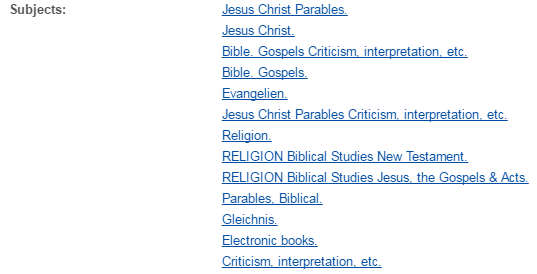
If you have identified an author or a title that you wish to start with you are one step ahead of others.
Go to our WorldCat Discovery System.
From the "advanced search" boxes you will enter as much of the author's name or title that you know. The drop down boxes can be changed to "author", "title", or "keyword" (among others).

From the results list, click the title and this will take you to the materials page. On the materials page, just below the picture of the book, is the "Description" section. Within "Description" is a list of subject headings assigned to your book. If you select one of those subject headings you will then search for materials with that exact subject. Take the time to write down the subject heading for later seaching (useful in many databases).

If you do not have an author or title in mind, then you will begin by performing a Keyword Search. Keyword Searching is what many of you do when you "google" something. Basically, keywords are known words that seem relevant to your topic. If you went through the process of the previous tab, Understand the Assignment and Topic, then you should already have a list of keywords that can help with this next step. Go to our WorldCat Discovery System.
You will then enter your keywords into the Keyword search box.

From the results list, choose any titles that sound appropriate. Open the "Descriptions" found below the picture of the book. If the title truly sounds relevant to your topic, then pay attention to the "Subjects" box. That box contains subject headings that are assigned to books that have similar subjects. Write down the relevant subject heading, as those can be used in many of our databases.

Now that you have determined the appropriate subject headings, it is time to develop your search strategy.
Just searching for your subject heading will produce a list of related materials. The problem may be that the list is too long or not all are relevant. To narrow the list to just what is key to your topic, it is recommended that the subject heading list be narrowed down.
Boolean operators are used in many/most search engines are are helpful in defining a search string. There are three basic operators. One of them adds materials to the results list. This is OR. OR produces a results list that includes any occurance of either term. OR is useful when you don't know the most accurate keywords and need to search using synonyms in order to find the right words. AND narrows the results list as it requires that each of the terms be in every item in the results list. AND is useful with you are narrowing down to the most relevant items that you will use for your project. NOT is the last operator. NOT is used to eliminate some items from the results list. If you want the results to include everything for certain words, but not for one particular term, put NOT before the term that you want eliminated from your search. NOT is powerful and often eliminates things that may have been useful, so use it with care and after you've thought through the consequences of eliminating certain items from the results list. [more about Boolean operators can be found under the "Search for Sources" tab]
Now that you understand Boolean operators, we can move on to creating a search query.
One of the most powerful search techniques is the Subject AND Keyword search method. By searching within a subject heading for a specific keyword you have an increadibly narrow search within the relevant topic. This nearly guarentees that the results will be precise and relevant for your project.
To perform a Subject and Keyword search, you must change the advanced search dropdown boxes and enter the appropriate term in the right boxes.

Some search engines will allow you to just paste the Subject Heading in the search box, others will require that you add the term AND between the subject terms. When in doubt, use "AND" in place of the --. So, based on the Subject Headings found above, we should enter <"Jesus Christ" AND parables> in the Subject search box in order to get the appropriate results. Under Keyword we can add one or more terms to narrow that subject to what exactly we are looking for. If, for example, we entered "good Samaritan" in Keyword, with <"Jesus Christ" AND parables> in Subject, our results will only be about the parable of the Good Samaritan as found in the New Testament.

If we had only searched for the Keywords "Good Samaritan" we would have been looking at 1000's of articles dealing with various "good Samaritan" laws in different states.
Life Pacific University Alumni Library | 1100 W. Covina Blvd | San Dimas, CA 91773 | Ph: (909) 706-3009 | Email: library@lifepacific.edu
Return to Life Pacific University homepage | Log in to LPU email